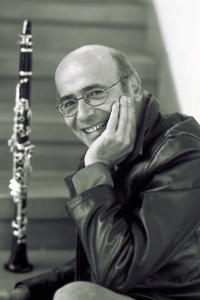|
 |
has performed with renowned conductors
such as Seiji Ozawa, Zubin Mehta, and Pierre Boulez. He
has served since 1989 as professor of clarinet at the
renowned Conservatoire National de Musique de Paris, the
same school he had also attended in the 60’s, winning
first price in both clarinet and chamber music there.
During his career, he has worked extensively with the
pre-Mozart clarinet repertoire, such as Stamitz and
Molter, and also the contemporary repertoire created by
Bério, Stockhausen, Louvier, Grisey, Fénelon, Singier,
Burgan, and Finzi.
“My love for music comes to me from my family,” said
Arrignon. “My grandfather was a clarinetist; my father
was a violinist. I entered the Conservatoire de Paris at
age 16, and I was awarded the first prize for clarinet
in 1966.”
Arrignon’s teachers included Ulysses
Delescluse and Fernand Oubradous. |
|
He also completed
advanced training in chamber music with instructor
Pierre Pierlot.
“At the urging of my teacher, Mr. Delescluse, I went to
study in the United States at Michigan University,” said
Arrignon. “This experience was extremely valuable. I was
immediately appreciative of the quality of instruction
and the professional character of the American schools I
saw. Moreover, even though I like to say that I am a
fervent defender of the French schools, I strongly
encourage my students to seek this type of experience
abroad.” Arrignon also studied at Interlochen Arts
Academy in Michigan.
After Arrignon’s return to France, Arrignon joined
Musique Vivante, a group which performed contemporary
music. He then became a member of the Ensemble
Intercontemporain, created by Pierre Boulez. Arrignon
devoted himself for seven years to the study of the 20th
century repertoire. “I want to stress that the 20th
century works hold some unique masterpieces,” he said.
“I also did a lot of recordings, of Schoenberg,
Stravinsky, Brio, Fenelon, and other composers. This
period was very rich in creativity for me, and I must
say that working with Pierre Boulez taught me about
becoming a true professional, which is an invaluable
lesson.”
Arrignon was also appointed solo clarinetist with the
Paris Opera Orchestra in 1984. “This appointment brought
to me some valuable opportunities of performing with the
best conductors, people like Ozawa, Boehn, Stein, and
Makerras,” he said. “I continued as soloist there, and
in 1989 I received the appointment as professor of
clarinet at the Paris Conservatory.
“Since I enjoy teaching so much, I am presently
concentrating on that, and I have conducted numerous
masterclasses throughout the world. I find that talented
students are highly sought after today, and their course
of study is getting longer and more concentrated. I
think it is vital for me, as their professor, to
maintain the exceptional level of the French school, and
to help prepare these young musicians for their
professional lives.” Even though he spent considerable
time with some of France’s
most notable ensembles and opera professionals, seven
years with the Ensemble Intercontemporain and five years
with the Opera Orchestra, he is pleased with his career’s
natural gravitation towards solo work and teaching. “Yet
it still gives me great pleasure to perform with an
orchestra,” he said.
You might say that the highest goal of Arrignon’s
teaching is to transmit those qualities, and above all,
the acute awareness of interpretation to his students.
“At the Conservatory, the level of study is very high,
and students work a lot on their technique,” he said.
“The most difficult thing is to make them aware of the
importance of interpretation. This task is a daily
exercise, a constant search. Everything is concrete,
anything can be practiced, but the difference between a
good performance and a great one is achieved when a work
is given a very personal interpretation… [Music] is a
real and very demanding profession, but one that is
lived with passion. I urge all young musicians to work
at their art, for in doing so they will find the
satisfaction of practicing a profession that they enjoy.” |
